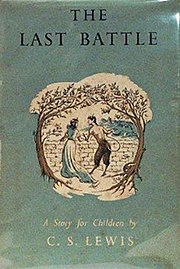
The final Chronicles of Narnia book in both publication
order and chronology opens with Shift the Ape finding a dead lion’s skin and
outfitting his friend Puzzle the Donkey with it to have him masquerade as
Aslan, with Narnia’s King at the time, Tirian, hearing of the Lion’s coming,
although astrology notes that something is amiss. Indeed, events such as
deforestation are occurring in Aslan’s name, with the main adversaries, the
Calormenes, at work. Tirian and his close friend, the Unicorn Jewel, ultimately
find themselves brought before Shift, who poses as a king and Aslan’s
mouthpiece, the two separated.
When Tirian finds himself bound to a tree for killing Calormenes that abused a talking horse, he calls out for help, with Jill Pole and Eustace Scrubb, protagonists of The Silver Chair, rescuing him, in return receiving training for combat with those who use Aslan’s name for evil. Some convincing is necessary to turn the talking Beasts against the Calormenes, with battle breaking out near a stable from which hardly anyone comes back out, the villains’ deity Tash playing a role, as well. The heroes ultimately find themselves witness to the end of Narnia as they know it.
A major twist at the end will definitely tear at the heartstrings, with even this reviewer driven to tears, something that rarely happens when he reads fiction. The concluding Narnia book is definitely a good sendoff for the series, although there are some indicators of xenophobia, with some terminology some in modern times would find somewhat offensive, and with prior entries of the series, there are some nuances of British English that haven’t aged well. Regardless, those who enjoyed previous Narnia books will most likely appreciate this one, although they should definitely be ready for an emotional end.
When Tirian finds himself bound to a tree for killing Calormenes that abused a talking horse, he calls out for help, with Jill Pole and Eustace Scrubb, protagonists of The Silver Chair, rescuing him, in return receiving training for combat with those who use Aslan’s name for evil. Some convincing is necessary to turn the talking Beasts against the Calormenes, with battle breaking out near a stable from which hardly anyone comes back out, the villains’ deity Tash playing a role, as well. The heroes ultimately find themselves witness to the end of Narnia as they know it.
A major twist at the end will definitely tear at the heartstrings, with even this reviewer driven to tears, something that rarely happens when he reads fiction. The concluding Narnia book is definitely a good sendoff for the series, although there are some indicators of xenophobia, with some terminology some in modern times would find somewhat offensive, and with prior entries of the series, there are some nuances of British English that haven’t aged well. Regardless, those who enjoyed previous Narnia books will most likely appreciate this one, although they should definitely be ready for an emotional end.
No comments:
Post a Comment